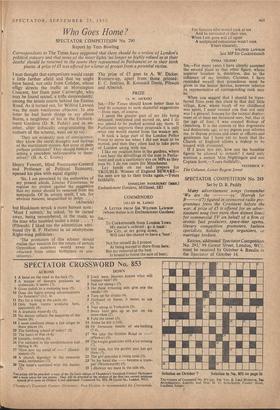Who Goes Home?
Correspondents to The Times have suggested that there should he a review of London's political statuary and that some of the lesser lights 'no longer so highly valued as at their deaths' should be returned to the towns they represented in Parliament or to their birth places. A prize of £5 was offered for a letter of protest from a potential victim.
I HAD thought that competitors would range a little farther afield and that we might have heard, not only from Cobden, whose effigy directs the traffic at Mornington Crescent, but from poor Cartwright, who may be found seated, a trifle despondently, among the tennis courts behind the Euston Road. As it turned out, Sir Wilfrid Lawson was the most vociferous objector. In one letter he had harsh things to say about Burns, a neighbour of his in the Embank- ment Gardens (D. R. Peddy) and in an- other, after ironically congratulating the authors of the scheme, went on to say :
'They are evidently men of omniscience;
they know the secret thoughts and feelings of the inarticulate masses. Are some of them perhaps politicians? They should beware of setting a precedent unfavourable to them-
selves!' (H. A. C. Evans.)
Henry Fawcett, blind Postmaster-General and Prdfessor of Political Economy, opened his plea with equal dignity :
'Sir, I am permitted by the authorities of my present abode, Limbus Victorianus, to register my protest against the suggestion that my statue should be removed from the metropolis. Of its artistic merit, I am, for obvious reasons, unqualified to judge. . „'
(Alberick) but Huskisson struck a more human note : 'Must I submit,' he asked, `to be carted away, being remembered, in the main, as the man who tumbled under a train . . . ? (Pibwob). I liked too the admonition attri- buted (by B. P. Hatton) to an anonymous Right-wing politician :
The promoters of this scheme should realise that sanction for the return of certain Opposition members would never be obtained from either birthplace or con- stituency.'
The prize of L5 goes to A. W. Dicker. Runners-up, apart from those printed : E C. Jenkins, R. Kennard Davis, Pibwob and Alberick.
PRIZE
(A. W. DICKER) SIR,—The Times should know better than to lend its columns to such shameful suggestions --- from men, of course.
I spent the greater part of my life being detained, restrained and moved on, and I do not intend to be pushed around any more. If Parliament supports these proposals it is only what one would expect from the weaker sex.
It took a large part of the London Police Force to move me when I did not want to be moved, and then they often had to take parts of London along with me.
I like my position here in the gardens, where I can hear the drivellings of the men in Parlia- ment and cast a cautionary eye on MPs as they pass by. I do not yearn for Manchester. Lay hands on me and prepare for TROUBLE. Women of England BEWARE— the men are up to their tricks again.—Yours faithfully,
EMMELINE FANKHURST (MRS.)
Embankment Gardens, Millbank, SE1 COMMENDED
(ALLAN M. LAING)
A LETTER FROM SIR WILFRID LAWSON (whose statue is in Embankment Gardens) SIR,—
To Cockermouth from London Town My statue's ordered : go it must: The City, at my going down,
Will take the chance to have a 'bust.'
Not for myself do I protest
At being moved to there from here; But my removal at the best
Is hound to boost the sale of beer;
For boozers who would look at me
And be reminded of their vice, When I am gone will all agree A sculptured conscience wasn't nice. Yours sincerely,
WILFRID LAWSON
late MP for Cockermouth
(VERA TELFER)
Srn,—For many years I have silently accepted the second place to that other figure, whose superior location is, doubtless, due to the influence of my brother, Clarence. I have reminded myself that precedence must be given to the Senior Service, however inferior its representative of corresponding rank may be.
When you suggest that I should he trans- ferred from even this place to that dull little village, Kew, where much of my childhood was spent, I must remind you that not only was 1 a general, famous for the tactical deploy- ment of at least ten thousand men, hut, that at the age of four, I was created Bishop of Osnaburg. It is the custom of this degenerate and democratic age, so my pigeon post informs me, to depose princes and sneer at officers and gentlemen but I have yet to learn that the Church of England allows a bishop to be treated with disrespect.
If 1 leave this site, how can the humbler figures be allowed to remain? I need only mention a certain Miss Nightingale and one Captain Scott.—Yours faithfully, FREDERICK F. The Column, Lower Regent Street
































 Previous page
Previous page